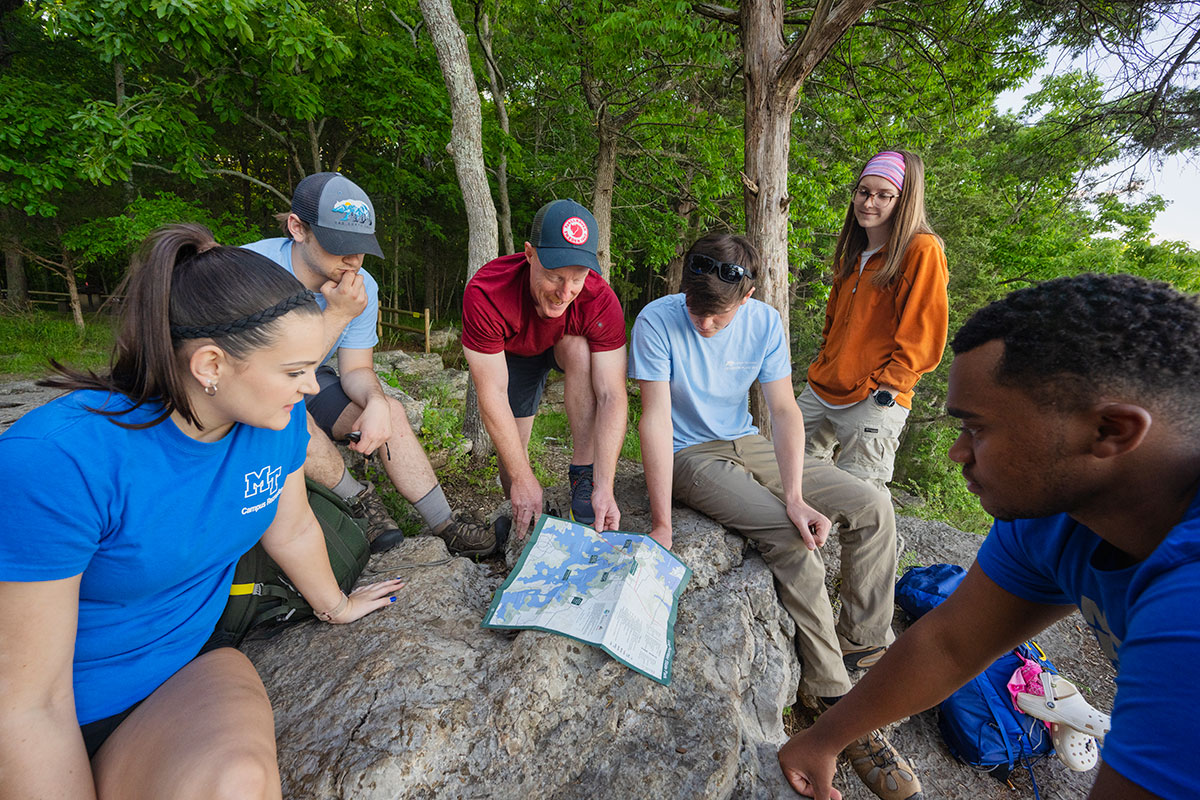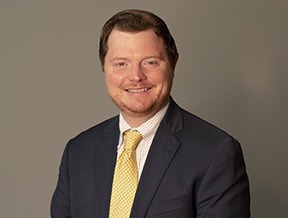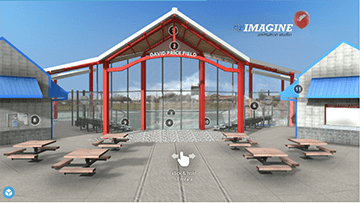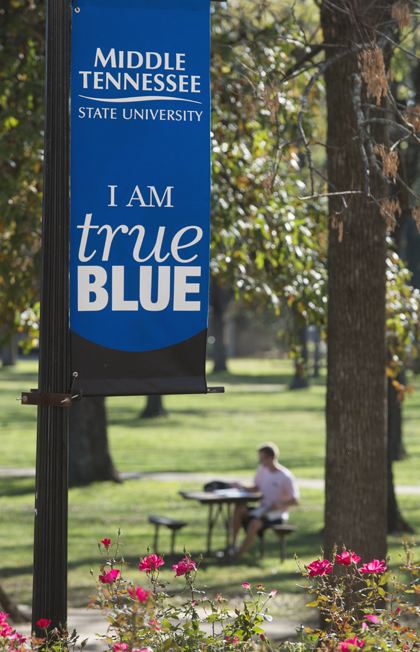
Leisure and Sport Management
Turn your passion for healthy living into a dynamic career.
Leisure and Sport Management, B.S.
The Bachelor of Science in Leisure and Sport Management is offered through the College of Behavioral and Health Science at MTSU.
If you value healthy living combined with the enjoyment of leisure and sport experiences, then why not turn your passion into a career? Want to avoid working at a desk for the rest of your life? Are you a people person? Do you enjoy being active at work? The Leisure and Sport Management major at Middle Tennessee State University offers specializations in recreation administration, outdoor recreation, and sport management.
Leisure and Sport Management students prepare for their careers through an applied and experiential course of study. Leisure and Sport Management prepares students for diverse career opportunities in various sectors of the industry and our alumni are pursuing careers ranging from National Park Service Ranger to Community Recreation Center Director to University Athletic Directors and everything in between.
The major in Leisure and Sport Management (LSM) requires 64 hours and provides knowledge, skills, and experiences for students interested in preparing for positions in the leisure and sport management professions. The major requires a general core accredited by the Council on Accreditation of Parks, Recreation, Tourism and Related Professions (COAPRT). Specializations in LSM include sport management, outdoor recreation, and recreation administration. A minor or advised electives of approximately 15 credit hours may also be chosen.
News Briefs

Patrick Nowlin serves as Senior Associate Athletic Director for the University of Notre Dame
Patrick Nowlin ('09, '10) currently serves as Senior Associate Athletic Director for the University of Notre Dame. He is responsible for the athletics business strategy including marketing, all athletic revenue streams and departmental communications. Under Nowlin’s direction, Notre Dame had its highest grossing revenue year in school history.
Prior to Notre Dame, he served as Senior Associate Athletic Director at the University of Oklahoma from 2016-2021. With Nowlin leading the Sooners business strategy, the department had its 5 highest revenue producing years in school history.
Nowlin got his start in sports business with Nashville Predators before joining Learfield and rising to the ranks of senior leadership. Patrick resides in South Bend, Indiana with his wife Diana. They have two children (Camden 5, Lillian 1).

MTSU students support inclusive recreation and adaptive sports programs for the city of Murfreesboro
In collaboration with Dr. Rodrigo Gomez and Dr. Richard Lewis from MTSU’s College of Media and Entertainment, students involved with the MT IMAGINE Animation Studio, and Murfreesboro Parks and Recreation, Leisure and Sport Management Professor Danielle Lauber helped create the virtual reality digitization of the David A. Price Miracle Field adaptive baseball field. The focus of the project was to enhance opportunities for Leisure Sports Management students to engage in inclusive programming online, as well as to support inclusive recreation and adaptive sports programs for the city. The project can be viewed at mtsu.edu/mtimagine/clients.php
News Briefs
Patrick Nowlin serves as Senior Associate Athletic Director for the University of Notre Dame

Patrick Nowlin ('09, '10) currently serves as Senior Associate Athletic Director for the University of Notre Dame. He is responsible for the athletics business strategy including marketing, all athletic revenue streams and departmental communications. Under Nowlin’s direction, Notre Dame had its highest grossing revenue year in school history.
Prior to Notre Dame, he served as Senior Associate Athletic Director at the University of Oklahoma from 2016-2021. With Nowlin leading the Sooners business strategy, the department had its 5 highest revenue producing years in school history.
Nowlin got his start in sports business with Nashville Predators before joining Learfield and rising to the ranks of senior leadership. Patrick resides in South Bend, Indiana with his wife Diana. They have two children (Camden 5, Lillian 1).
MTSU students support inclusive recreation and adaptive sports programs for the city of Murfreesboro

In collaboration with Dr. Rodrigo Gomez and Dr. Richard Lewis from MTSU’s College of Media and Entertainment, students involved with the MT IMAGINE Animation Studio, and Murfreesboro Parks and Recreation, Leisure and Sport Management Professor Danielle Lauber helped create the virtual reality digitization of the David A. Price Miracle Field adaptive baseball field. The focus of the project was to enhance opportunities for Leisure Sports Management students to engage in inclusive programming online, as well as to support inclusive recreation and adaptive sports programs for the city. The project can be viewed at mtsu.edu/mtimagine/clients.php
Related Media

The exciting Leisure and Sport Management program offers a range of career opportunities in the areas of outdoor recreation, sport, and community recreation management. This ever-changing field requires skilled, versatile professionals with expertise in program design and delivery, personnel management, and agency administration. Students have access to real world experience ranging from internships at state parks to study abroad experiences in Argentina. Potential careers include work in:
Outdoor Recreation
- National and State Park Service Ranger
- Summer Camp Director
- Environmental Educator
- Climbing Gym General Manager
- Wilderness Leadership Instructor (e.g., NOLS, OB)
Sports Management
- Athletic administration
- Coaching (all levels)
- Community/public relations
- General management
- Community and Recreational sport
- Youth sport
Recreation Administration
- Recreation Center Director
- University Campus Recreation Director
- Community Athletic League Director
- Day Camp Director
- Older Adult Recreation Programmer
- Community Parks Superintendent
Employers of MTSU alumni include
- Yosemite National Park
- Arnold Air Force Base
- LSU Campus Recreation
- Climb Nashville
- Metro Nashville YMCA
- Tennessee State Parks
- Nashville Soccer Club
- Tennessee Titans



Accreditation
Middle Tennessee State University's Leisure and Sport Management Program is accredited by the Council on Accreditation of Parks, Recreation, Tourism and Related Professions (COAPRT). The Council on Accreditation of Parks, Recreation, Tourism and Related Professions (COAPRT) accredits baccalaureate programs in parks, recreation, tourism, sport management, event management, therapeutic recreation, and leisure studies offered at regionally accredited institutions within the United States and its territories, and at nationally accredited institutions in Canada, and Mexico.
Mission Statement
The Leisure and Sport Management Program prepares graduates to address current and future challenges faced by leisure and sport agencies as well as the communities that they serve. Our approach to education is built on the formation of trusting relationships, a problem-based approach to instruction, and a willingness to challenge the status quo as well as our own comfort zones.
Vision Statement
The Leisure and Sport Management Program envisions a world in which all individuals have access to and can enjoy the benefits of safe and enriching leisure, sport, and recreation opportunities.
Core Values
In pursuit of its mission, the Leisure and Sport Management Program cultivates the following values:
- Curiosity. An interest in asking practical and intellectual questions that are based on the recognition that we always have more to learn. Curiosity necessarily entails an openness towards diverse points of view and life experiences.
- Collaboration. Almost every significant accomplishment in our field requires the collaboration of many individuals. Successful collaboration requires a willingness to ask for help, an openness to feedback, and a reasonable sacrifice of personal ambition for the good of the group.
- Professionalism. An attitude that understands that our everyday work is part of the larger field of leisure and sport management. We identify ourselves as leisure and sport professionals and take pride in our contributions to the field.
Forms & Manuals
Important Information Regarding Degree Mills
Please watch this important video regarding degree and accreditation mills. According to CHEA, "Degree mills and accreditation mills mislead and harm. In the United States, degrees and certificates from mills may not be acknowledged by other institutions when students seek to transfer or go to graduate school. Employers may not acknowledge degrees and certificates from degree mills when providing tuition assistance for continuing education. "Accreditation" from an accreditation mill can mislead students and the public about the quality of an institution. In the presence of degree mills and accreditation mills, students may spend a good deal of money and receive neither an education nor a useable credential. Read more on CHEA's website..
COAPRT Annual Data Report

CONTACT US

Please fill in the form below and we will contact you very soon













